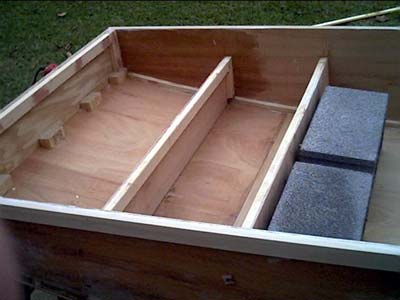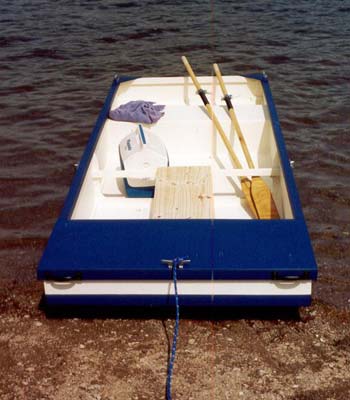Lewis LilJon 10
While surfing the net for mission
furniture kits about a year ago, I stumbled across a couple of
websites from builders of small boats. Well, you know what happened.
By October I had bookmarked dozens of boatbuilding websites and
had several makers’ pages almost memorized.
Steve Lewis’ excellent explanations
of the building process made it sound as though even I could build
a usable boat, so off I went for ¼” ply, some 1X2’s
and this magic stuff called PL Premium. It would be nearly 7 months
before the 10’ LilJon saw the water (the wettest October
and November on record made it tough on building outside), but
I now own and use the only rowing jonboat I’ve ever seen!

I didn’t own a table saw
at the time (Christmas is a wonderful thing!) so I played it safe
and built it with plumb sides, using ¾” square molding
for chine logs (internal). Steve’s plans left the seating
arrangement up to the builder, and while I was pondering what
to do with that, Paysons Build
The New Instant Boats and Michalak’s Boatbuilding
for Beginners arrived.
Now I was really in trouble! After
measuring, figuring, and scheming for a couple of weeks, I settled
on a flotation tank seat for the rear, and a lengthwise thwart
(a la Bolger/Payson) beginning at the center and running to the
front deck. From everything I’d read, that seemed to be
a good solution to the problem of trim when using the boat alone
or with a passenger.

Oars came from closet poles and
3/8” ply leftover from the deck. I’d never rowed anything
before so I didn’t have any experience to compare it to,
but I’d expected it to be as much trouble as paddling a
commercial jonboat. To my great surprise, the rocker in the stern
makes this boat easy to get going, and the 5” skeg makes
tracking good in all but a direct crosswind. Once when a lightning
storm came up out of nowhere on a local lake I easily outran all
the trolling motor guys back to shore! Nothing like a little motivation…
Since this was my first boatbuilding
effort and I was finding out something new everyday, I ended up
doing some unusual things and combining different construction
techniques—such as how to solve the problem of beveling
the bottom edge of the transom. With no table saw and after several
frustrating tries at getting a good bevel with a circular saw,
I finally just measured the angle with a bevel square and ran
a 2X4 through the chop saw and came up with blocks at the correct
angle. This looks really strange, but it works! The ones at the
bow are inside the deck/tank so nobody can see them.

Also, though I used chine logs,
the bulkheads and center thwart are filleted and taped. And I
ended up having to ditch the lengthwise thwart because I built
the boat too heavy to load and unload alone. So I cut out the
upper crosspiece and use a moveable rowing seat.
In the end, ideas from several
sources were used in this rowing jonboat:
-
Steve
Lewis- Figuring the transom angles, stern rocker, and
other good info.
-
Jim Michalak- Rowing Ditty Box, Oarlocks on the outside,
Attaching the skeg with Bondo and two layers of tape, Varnished
twine for oar leathers.
-
David
Beede- Using staples and twine to hold the buttblocks
while the PL cured.
-
Harold Payson- Lengthwise thwart, Wax paper over epoxy
joints.

And several builders’ websites
for tips on making oars, and something from just about every project
photo I could find (Duckworks archives are great for that).
So, my aim was to have a boat
to throw in the back of the truck and take my son or wife fishing,
something that I could build myself that would be both stable
and easy to build. The LilJon fit the bill, though what I ended
up doing with it may be unconventional. AND, with all that rocker
it could be sailed, sort of a bigger Brick. And if I could put
in a word for Steve, I was able to have the hull together before
I’d ever read a word of Bolger, Payson, Michalak, etc.

Everybody in the family
enjoys rowing this boat. That’s good, ‘cause I can
sit in the back and watch where we’re going while we’re
fishing, and every time my son has oars in his hand is one less
opportunity for him to part my hair with a crankbait.
Rick
Cunningham
Birmingham, Alabama

|

